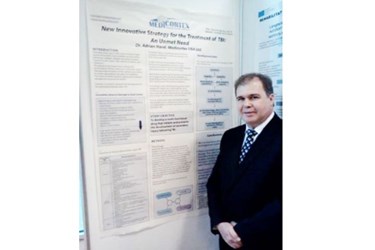Dr. Adrian Harel Of Medicortex Proposes A Multi-Functional Drug Approach For The Treatment Of Traumatic Brain Injury (TBI)

Research could lead to new drugs to halt or prevent secondary TBI
With the ever-more-frequent news reports of athletes' careers and even their lives ending following a seemingly minor head injury, and tens of thousands of military personnel returning from combat with severe brain injuries, public awareness of the problem has increased dramatically. When you add the occurrences of post-traumatic stress disorders that so frequently manifest after these brain injuries, the severity of the problem becomes even more apparent. It's a terrible problem that calls for a more comprehensive approach than is currently available. So says Dr. Adrian Harel, a renowned neurobiologist with many years of experience in the pharmaceutical and biotech industry. Dr. Harel and his research team at Mediocortex USA Ltd. are working to develop a more comprehensive approach to treating traumatic brain injury, or TBI.
Says Dr. Harel, "Acute neurodegenerative conditions, and especially traumatic brain injury, are widely recognized as the leading cause of CNS (central nervous system) impairment. In the US alone, this 'silent epidemic' affects more than 1.7 million individuals annually." Dr. Harel explains that the greatest incidence of TBI occurs among 1-5 year old children, 15-24 year old males, and people over 75 years of age. And yet, despite the huge and constantly growing patient population, TBI is widely recognized as an under-served and an unexplored therapeutic area.
The problem, explains Dr. Harel, is that while the medical community has made great strides in treating individual pathologies caused by TBI, those processes/pathologies are highly interconnected, so that addressing the individual symptoms of brain injuries is rendered ineffective in achieving a goal of full recovery. If the primary injury event isn't damaging enough, the body's own self-repairing capabilities, coupled with the responses by the autoimmune system, actually serve to initiate additional destructive secondary events, complicating treatment options and further compromising the patient's chances for a full recovery.
Dr. Harel and the researchers at Medicortex USA Ltd. are in the process of developing a more inclusive approach to treating TBI, by addressing the body's natural response mechanisms as well as treating the initial injury, this broad-scope approach offers the potential promise of recovery heretofore unheard of.
Researchers in this area have their work cut out for them. Despite the fact that over the past decade, more than seventy clinical trials have been conducted on drugs for the treatment of TBI (and more than thirty were with drugs specifically targeted at attenuating secondary injury), all of the Phase III clinical trials failed to show significance at their primary endpoint.
Some of the pre-clinical studies have suggested promising candidates, but none to date have proved effective. "Obviously, the absence of approved drugs for TBI treatment, and the repeated failures in clinical trials, highlights the need for the development of improved treatment modalities and new innovative strategies if we are to address an enormous and growing clinical, sociological, and economic need," says Dr. Harel. "What is desperately needed is a pharmacological treatment regimen that addresses the interconnected pathologies simultaneously, either by combining agents that have complementary effects or by using multi-functional drugs that can affect multiple neurological pathways."
To date Medicortex has developed a strong pipeline of proprietary, chemically-verified lead compounds, "These NCEs (new chemical entities) are potent multifunctional drug candidates with high solubility and stability in the plasma that are able to cross the blood-brain-barrier," Dr. Harel explains. Medicortex's first lead candidates possess two or more of the properties on which the firm's research is currently focused: antibiotic, anti-inflammatory, anti-oxidant, and the ability to bind free metal ions.
Taken together, this kind of multi-functional approach will target biochemical pathways that occur at different time points post-injury, thereby attenuating and even preventing the secondary TBI-associated death of brain neurons and the ensuing neurological dysfunction. Dr. Harel and the researchers at Medicortex expect that, once proven to be safe and efficacious, this unique family of molecules will be further developed to become a new class of drug for the treatment of TBI.
"We are working to fill an unmet need," says Dr. Harel, "and to give new hope to TBI patients of all ages."
About Medicortex:
Founded in 2011 by Dr. Adrian Harel, Medicortex USA Ltd. is a start-up pharmaceutical company focused on the discovery and pre-clinical development of innovative therapies for the treatment of acute neurodegenerative conditions, including traumatic brain injury, exposure to toxic nerve agents and stroke. Medicortex's mission is to develop a truly effective neuroprotection therapy that limits the damage in brain injury, based on a novel multifunctional drug approach. By doing so, Medicortex will provide a solution to an unmet need for the treatment of acute neurodegenerative diseases. Currently, Medicortex operates in the United States and Israel. For more information, visit http://www.medicortex.com
Source: Medicortex
